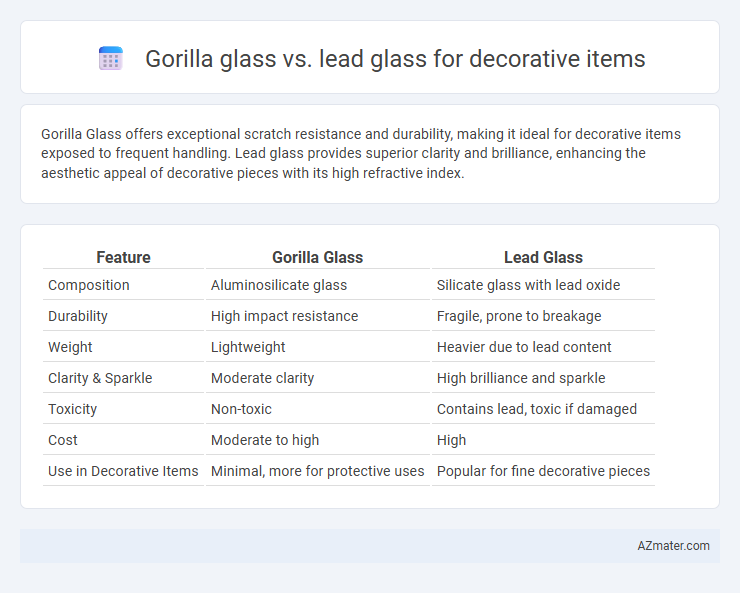Gorilla Glass offers exceptional scratch resistance and durability, making it ideal for decorative items exposed to frequent handling. Lead glass provides superior clarity and brilliance, enhancing the aesthetic appeal of decorative pieces with its high refractive index.
Table of Comparison
| Feature | Gorilla Glass | Lead Glass |
|---|---|---|
| Composition | Aluminosilicate glass | Silicate glass with lead oxide |
| Durability | High impact resistance | Fragile, prone to breakage |
| Weight | Lightweight | Heavier due to lead content |
| Clarity & Sparkle | Moderate clarity | High brilliance and sparkle |
| Toxicity | Non-toxic | Contains lead, toxic if damaged |
| Cost | Moderate to high | High |
| Use in Decorative Items | Minimal, more for protective uses | Popular for fine decorative pieces |
Introduction to Gorilla Glass and Lead Glass
Gorilla Glass, a chemically strengthened glass developed by Corning, is renowned for its high durability, scratch resistance, and lightweight properties, making it ideal for protective surfaces and premium decorative items. Lead glass, also known as crystal glass, contains lead oxide which enhances its refractive index and weight, offering superior brilliance and clarity favored in traditional decorative objects and fine glassware. While Gorilla Glass emphasizes toughness and modern functionality, lead glass prioritizes aesthetic appeal and optical excellence, influencing their application in decorative designs.
Key Properties Comparison
Gorilla Glass offers superior scratch resistance, high impact durability, and enhanced clarity due to its chemically strengthened aluminosilicate composition, making it ideal for decorative items requiring long-lasting aesthetics. Lead glass, known for its high refractive index and brilliance, provides exceptional light dispersion and weight, giving decorative pieces a luxurious sparkle but with lower resistance to scratches and impact. The choice between Gorilla Glass and lead glass depends on the desired balance between durability and visual brilliance in decorative applications.
Durability and Strength Analysis
Gorilla Glass offers superior durability and scratch resistance compared to Lead Glass, making it ideal for decorative items exposed to frequent handling. With a high tensile strength of approximately 700 MPa and excellent impact resistance, Gorilla Glass withstands drops and pressure better than the softer, more brittle Lead Glass, which typically has lower strength and is prone to chipping. Lead Glass, while valued for its clarity and brilliance due to lead oxide content, lacks the mechanical robustness required for long-lasting decorative applications.
Transparency and Aesthetic Appeal
Gorilla Glass offers superior transparency with high scratch resistance and clarity, making it ideal for decorative items that require durability without compromising visual appeal. Lead glass, known for its brilliance and refractive properties, enhances aesthetic appeal through its weight and sparkle, but is more prone to scratches and less transparent under direct light. For decorative applications prioritizing long-lasting clarity and a sleek modern look, Gorilla Glass is often preferred over lead glass.
Weight and Handling Differences
Gorilla Glass offers significantly lighter weight compared to Lead Glass, enhancing ease of handling and reducing strain during installation or movement of decorative items. The higher density of Lead Glass makes it heavier and more fragile, increasing the risk of damage and requiring more careful handling. Opting for Gorilla Glass improves durability and portability without compromising on aesthetic clarity in decorative applications.
Safety Considerations
Gorilla Glass offers enhanced safety features for decorative items due to its high scratch resistance and durability, reducing the risk of breakage and sharp shards. In contrast, lead glass, while visually appealing with its clarity and weight, contains toxic lead content posing health hazards if the item is chipped or broken. Choosing Gorilla Glass minimizes potential injury risks and environmental concerns associated with lead exposure, making it a safer choice for decorative purposes.
Cost and Availability
Gorilla Glass, known for its high durability and scratch resistance, typically incurs higher costs compared to lead glass due to advanced manufacturing processes. Lead glass, widely available and easier to produce, offers a more affordable option for decorative items but lacks the robustness and modern appeal of Gorilla Glass. Availability-wise, lead glass remains prevalent in traditional decorative markets, while Gorilla Glass is increasingly accessible through specialty suppliers targeting premium design applications.
Environmental Impact
Gorilla Glass, made from alkali-aluminosilicate, offers a lower environmental impact due to its durability and recyclability, reducing waste over time compared to lead glass, which contains toxic lead oxide harmful to ecosystems. The lead content in decorative lead glass poses substantial risks during production, disposal, and potential leaching, contributing to soil and water contamination. Choosing Gorilla Glass supports sustainability by minimizing hazardous waste and promoting safer manufacturing and end-of-life processes in decorative applications.
Popular Applications in Decorative Items
Gorilla Glass is widely used in decorative items such as luxury watch faces, high-end smartphone covers, and modern furniture accents due to its exceptional scratch resistance and durability. Lead glass, known for its brilliant clarity and high refractive index, is popular in crystal vases, chandeliers, and ornamental figurines that emphasize brilliance and light dispersion. While Gorilla Glass suits sleek, functional design elements requiring toughness, lead glass is preferred for traditional, visually striking decorative pieces with intricate detailing.
Choosing the Right Glass for Your Decor
Gorilla Glass offers exceptional durability and scratch resistance, making it ideal for decorative items that require longevity and a sleek, modern aesthetic. Lead glass, known for its high refractive index and brilliance, enhances decorative pieces with a vibrant sparkle and classic elegance, perfect for intricate designs and luxurious settings. Selecting the right glass depends on the balance between durability and decorative appeal, where Gorilla Glass suits everyday functional decor and Lead glass elevates ornamental displays.

Infographic: Gorilla glass vs Lead glass for Decorative item
 azmater.com
azmater.com